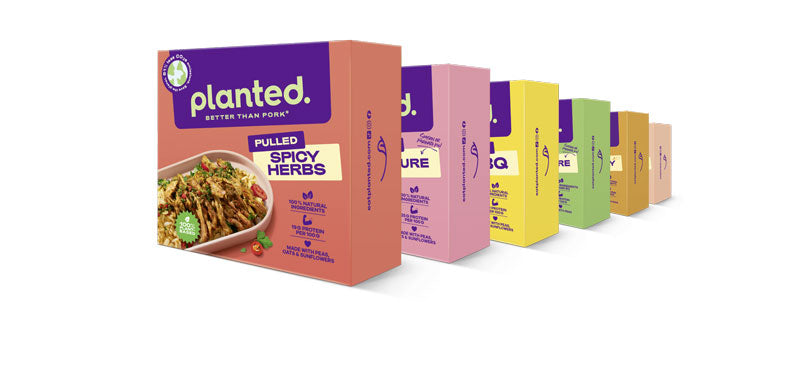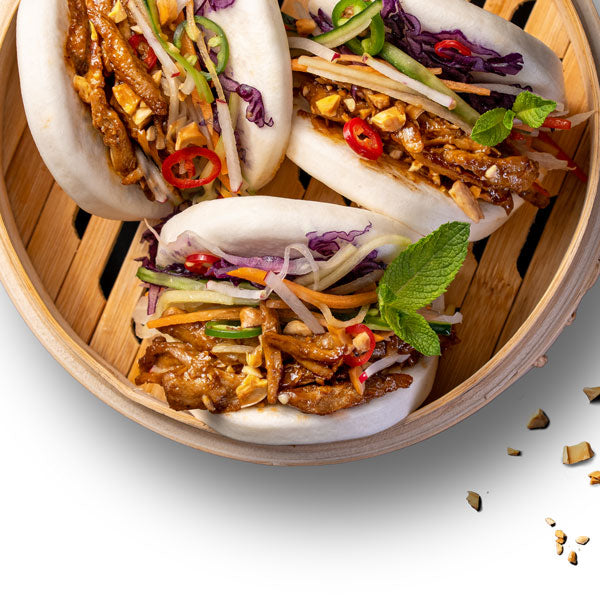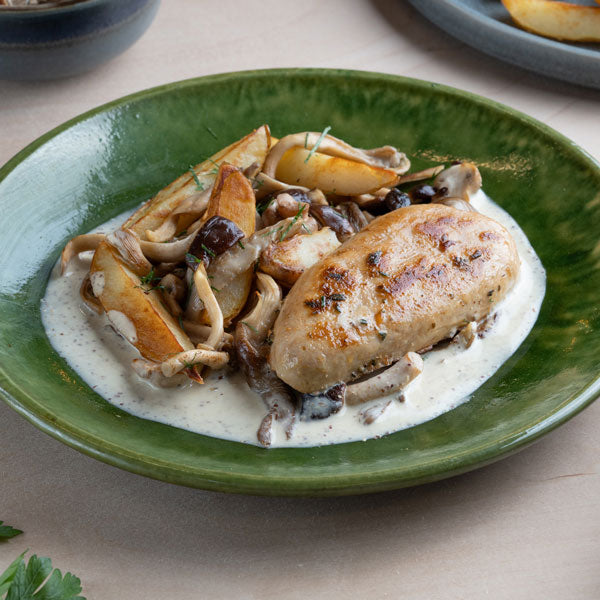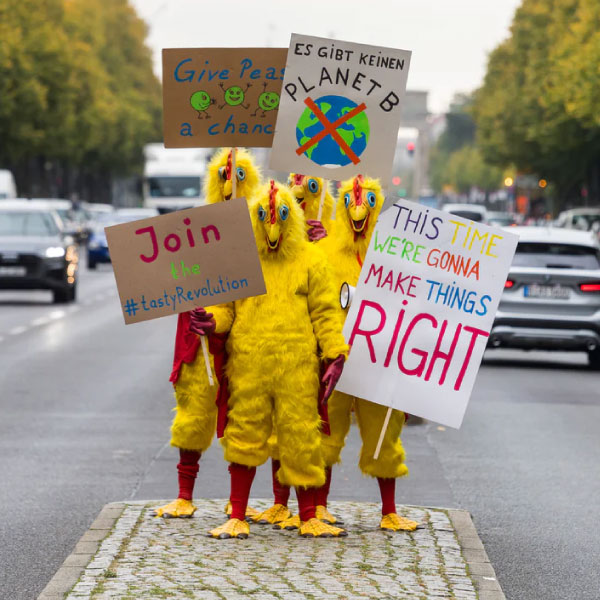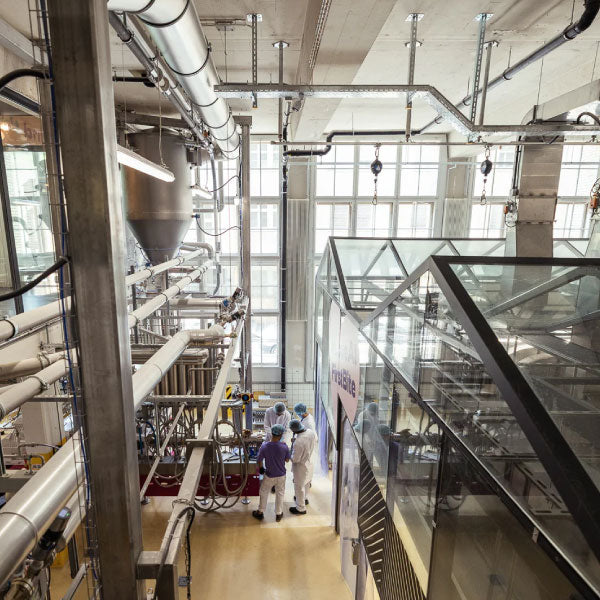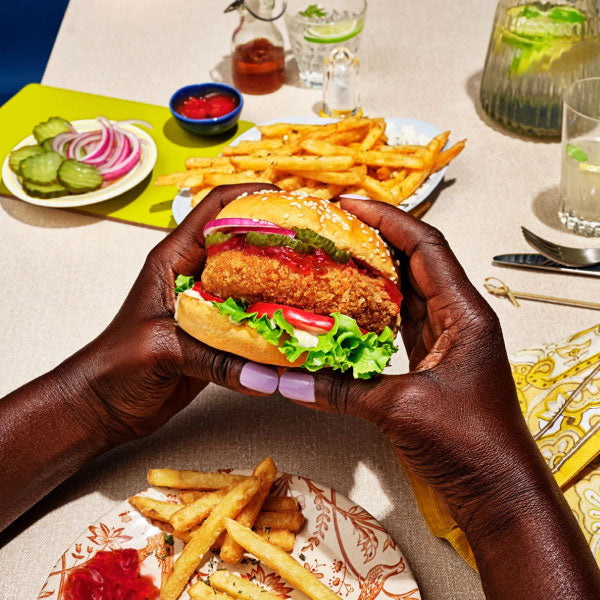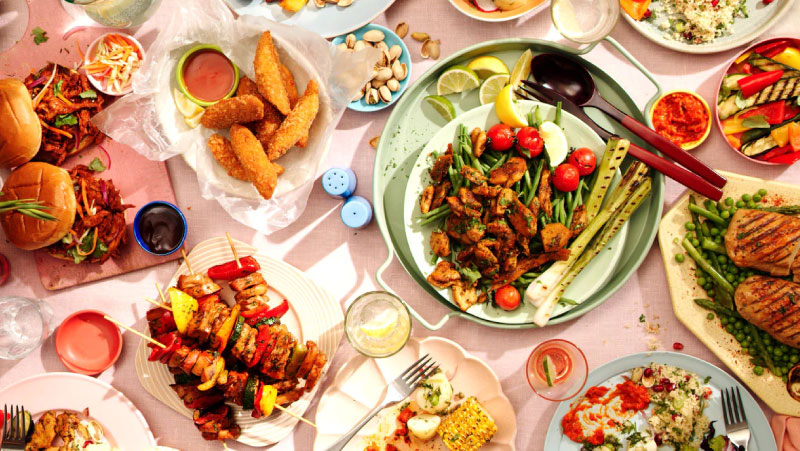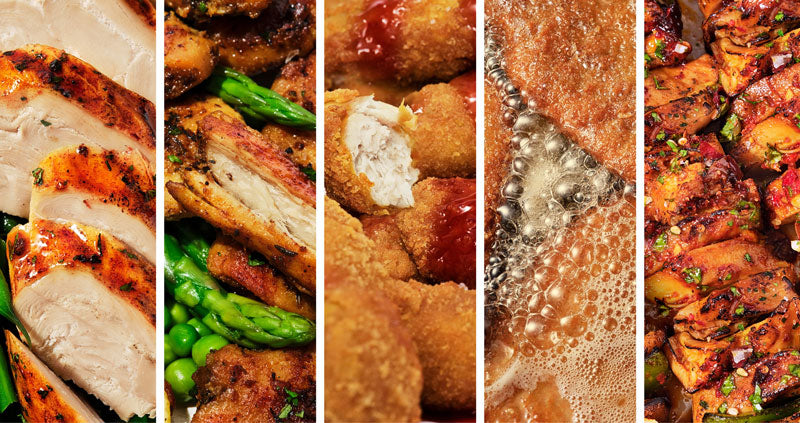Better meat than that of animals


The CO2 and water footprint of planted products was compared to comparable, conventional animal products.
-
What is a B Corp?
B Corps are purpose-driven companies that use their position and influence to be a positive impact for everyone whose lives they touch - employees, communities, consumers and of course our planet - not just shareholders. As part of the strict certification process, our impact was comprehensively tested in all European Planted office locations and our production facilities. As a certified B Corp, we have joined both a strong global and Swiss B Corp community that meets high standards for social and environmental impact.
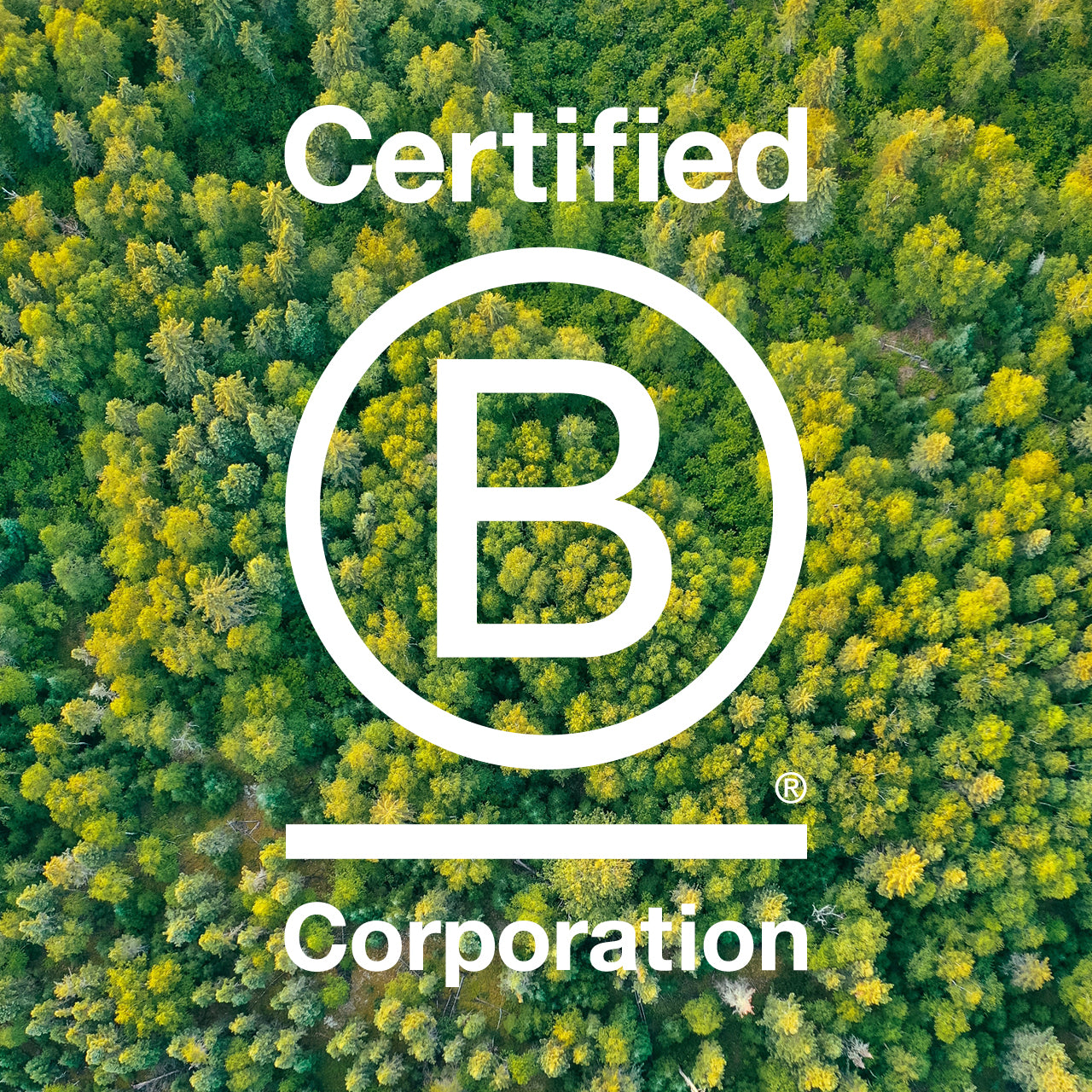
-
Our strong why
At Planted we believe in the power of change. We want to radically change the way meat is perceived, produced and consumed and encourage a shift from consuming animal proteins to consuming plant proteins, so that meat eaters can make sustainable, healthy and tasty choices in their everyday lives. Through our business activities we want to make the world a better place.
Our growth is driven by the desire to create a sustainable, healthy and responsible future for everyone - consumers, the planet and animals. We are more than a delicious product; we are a basic attitude. Sustainability, health and animal welfare are at the core of our identity. We make no compromises when it comes to quality and exclusively natural ingredients and ensure your trust through our commitment to excellence
We joined the B Corp movement to meet these high standards for ourselves.
-
What are we planning next?
We owe the certification to our exceptional commitment to sustainability and achieved a remarkable score of more than 90 points (category: excellent), including recognition that our business model conserves resources to a significant extent.
Planted's journey as a B Corp has just begun. We have a number of exciting projects in the pipeline that will further strengthen our positive impact on the world. However, that doesn't mean we can't improve. We are committed to continuous improvement in all areas and mandatory re-certification in three years will help us ensure we meet our commitments. We will work to amplify the positive impact of our plant-based meat by collaborating with everyone involved in its production.
-
Where do these numbers come from?
With the help of At Eaternity , an independent expert in life cycle assessments, we have calculated the ecological footprint of our products. A life cycle assessment is an internationally recognized method for measuring the environmental impact of a product throughout its life cycle.
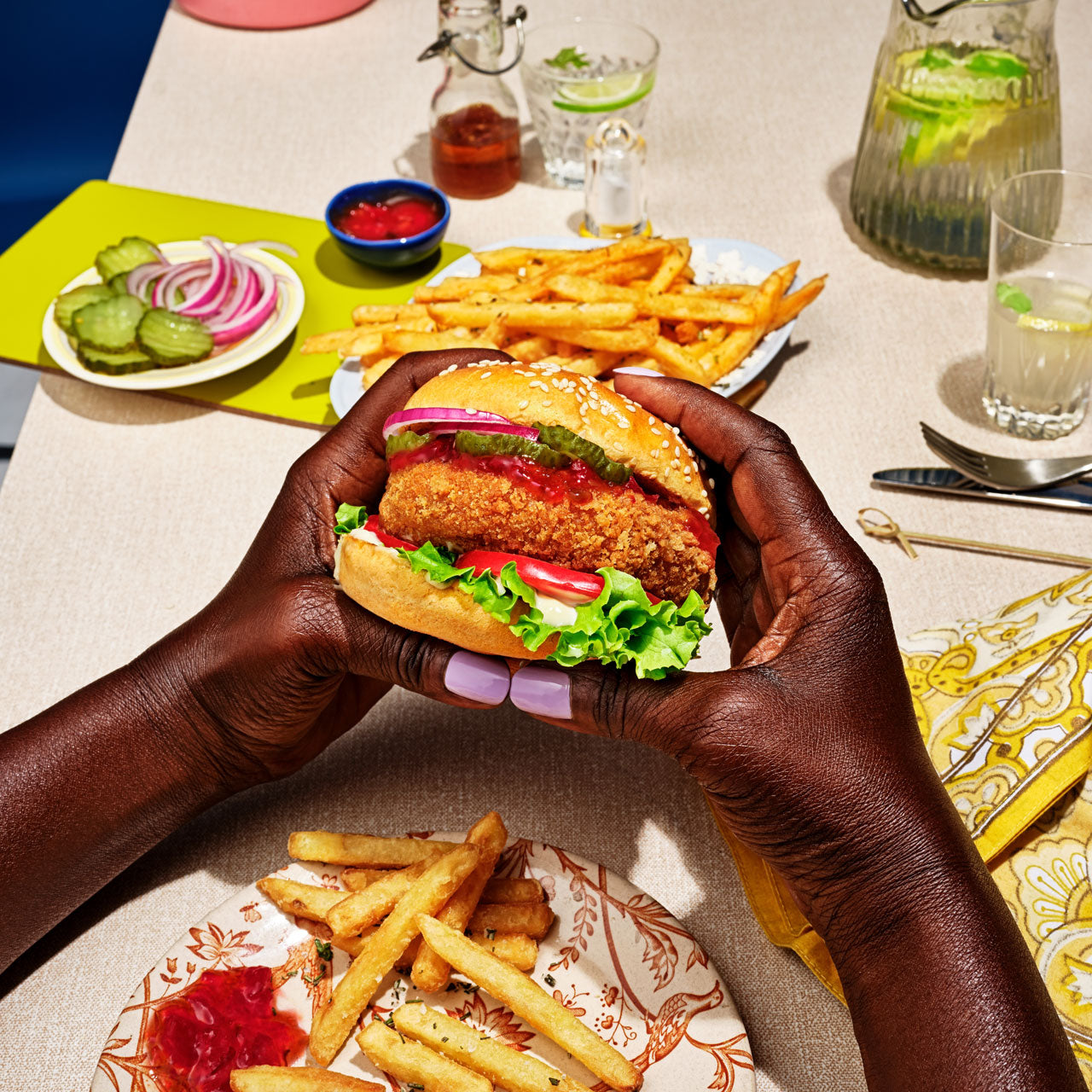
-
Carbon footprint
The carbon footprint takes into account all product steps, from growing and harvesting ingredients to processing, including energy consumption in our production facility, storage and transport to stores, and disposal of packaging (cradle-to-grave). .
-
Water footprint
For the water footprint, we analyzed the fresh water consumption for irrigating plants as well as the water consumption for animal husbandry and meat processing.
Bite by bite towards a more sustainable system
-
ENERGY & WATER
When planning and equipping our new production site in Switzerland, we wanted to create an intelligent infrastructure right from the start in order to minimize the ecological footprint of our operation.
Renewable energy
We use renewable energy for our production facility and offices in Switzerland. We even use 100% Swiss hydropower. And so that no energy is wasted, we use the heat generated during production to heat our offices and other parts of the building.
For our future energy needs, we are evaluating the best green energy mix available to us and want to supplement the power supply with our own solar panels on a nearby southern hill. We'll keep you updated on this!
Save water drop by drop
We use resources carefully and only use as much as necessary. In our production, water is mainly used for the product itself as an ingredient and for cleaning. We only use as much as necessary to maintain our cleaning routine, which has the highest standards of hygiene, quality and safety. In order to reduce water consumption as much as possible, we have installed water saving measures across offices. We also pay attention to what goes into the wastewater: our factory is equipped with a wastewater collection tank in which the production wastewater is mixed and pH-neutralized before it enters the sewage system.
-
INNOVATION
As a foodtech start-up that explores new frontiers, we are particularly innovative. We have focused on building a strong in-house R&D team to identify new alternative proteins and develop new biostructuring methods and technologies. We are convinced that biostructured proteins will be superior to animal meat in the future in terms of taste, sustainability, health, efficiency and price. We are committed to using only 100% natural ingredients and no additives in all of our products - making them a healthy and better option for everyone. We get really excited when we think about what product we'll bring to market next and are convinced that the variety of options for people who want to consume less animal protein is the key to success. And: We love to challenge ourselves.
We make a science out of it. -
CIRCULARITY
By upcycling by-products from other food value chains, we contribute to a more sustainable food system. Our planted.pulled contains flour from sunflower pellets - the high-quality by-product of sunflower oil production. The great thing about it is that the use of these pellets in human nutrition not only makes sense from a circular economy perspective, but the pellets are also rich in macro and micronutrients. Not to mention, the result is delicious. And that is just the beginning. We are working with suppliers and research institutions to realize even more of this in the future.
-
PARTNER
Sustainable sourcing and supply chain support
In addition to quality and safety, we pay particular attention to the social and environmental risks in our supply chain. As a first step, we are strengthening our approach to procurement decisions and the review of key suppliers. Our supplier policy defines criteria for sustainable cooperation based on the ILO labor standards and the UN Guiding Principles on Business and Human Rights and describes the avoidance of environmental pollution. Where there are potential problems with suppliers and partners, we ask the necessary questions to motivate them to improve.
In addition to oats and sunflowers as protein sources, our pea proteins and fibers are Planted's most important raw materials. All plant-based ingredients are GMO-free. And since the cultivation of protein-rich plants in tropical regions is strongly linked to deforestation and the loss of biodiversity, we do not source any agricultural raw materials from species-rich rainforests.
We choose local ingredients wherever quality allows. At the moment this means that our rapeseed oil and water come from Switzerland and the peas come from Europe. In the future we would also like to use locally produced plant-based proteins. In order to achieve this in the right quality and quantity, we have joined forces with the Bern University of Agricultural, Forestry and Food Sciences (HAFL) and the company Peter Kunz eV (gzpk) to form a protein plant breeding project. Supported by the federal government, these partners are currently carrying out initial field tests. In collaboration with the Swiss Society for Proteins , we are trying to put the topic of alternative proteins on the political agenda.
-
PACKAGING
Our packaging must adequately protect the product and maximize its shelf life. Otherwise, more of our product would end up in the trash. Avoiding this is our top priority. Planted is all about finding innovative solutions, such as the packaging for our online shop. The cooler bag we ship in is made from recycled paper and is 100% recyclable, and the cooling pads are filled with tap water that can easily be drained into the sink.
-
RESOURCE EFFICIENCY
At Planted, we firmly believe that scarce resources must be used sparingly and responsibly. That's why we continually work to optimize our production processes and avoid waste wherever possible. For example, we recently completed a project that allows us to address start-up losses that occur when our machines are not yet fully heated or when parts of the product do not meet our quality standards (e.g. if they are too small). With this new process we were able to reduce losses by over 80%.
-
TEAM & COMMUNITY
We place particular emphasis on fairness and respect in all of our interactions. We do not discriminate against anyone based on gender, age, race, nationality or any other non-professional classification. These are principles that we all live by every day. To accommodate different needs and lifestyles, almost all jobs at Planted can be performed part-time and work hours are flexible.
We provide advice and training to acquire new skills and support the development of our team members. We also offer in-company training positions. And we place particular emphasis on mental health. All our team members have access to free and confidential expert advice and coaching.
Safety is always the top priority at the production site. We assess risks, implement measures to reduce risks and design special safety training courses. We track and analyze accidents and near misses and implement our findings to ensure similar mistakes are not repeated. We are currently implementing a code of conduct for our board, senior management and senior management that describes ethical business practices and social and environmental responsibility. -
CLIMATE PROTECTION PROJECT
Our company-wide travel policy states that we consider our environmental impact when selecting our travel options. Whenever possible, we use public transport and are exploring the possibility of holding online meetings instead of in-person meetings. However, sometimes we have to fly. We record these unavoidable flight emissions and compensate for them in high-quality climate protection projects. In 2022, business flight emissions calculated using quantitative science amounted to 30 tonnes of CO2-eq. We have decided to support a regional project in the Lake Constance area that promotes fertile soils as natural CO₂ sinks. This climate protection program in collaboration with the Swiss Bio Foundation stores carbon in agricultural soil and promotes measures that contribute to climate-friendly agriculture.
More information about the project: MyClimate
Every animal counts



